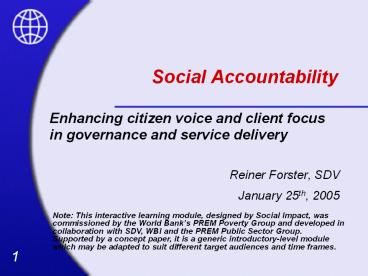Social Accountability - PowerPoint PPT Presentation
1 / 15
Title:
Social Accountability
Description:
Supported by a concept paper, it is a generic introductory-level module which ... Their conduct they must obey the law, rules, procedures and not abuse their powers. ... – PowerPoint PPT presentation
Number of Views:1924
Avg rating:3.0/5.0
Title: Social Accountability
1
Social Accountability
Enhancing citizen voice and client focus in
governance and service delivery
- Reiner Forster, SDV
- January 25th, 2005
Note This interactive learning module, designed
by Social Impact, was commissioned by the World
Banks PREM Poverty Group and developed in
collaboration with SDV, WBI and the PREM Public
Sector Group. Supported by a concept paper, it
is a generic introductory-level module which may
be adapted to suit different target audiences and
time frames.
2
What is Accountability?
- Accountability is the obligation of power-holders
to account for or take responsibility for their
actions. - Power-holders holding political, financial or
other forms of power, e.g. public officials,
private employers, donors, service providers,
traditional leaders, NGOs. - Key area government or public accountability
- builds on the implicit social contract between
citizens and public officials. - obligation of public officials and the right/
entitlement of citizens
3
What are public officials responsible for?
- Their conductthey must obey the law, rules,
procedures and not abuse their powers. - Their performancethey must serve the public
interest in an efficient, effective and fair
manner. - All states have some form of mechanisms to
promote or ensure accountability of public actors.
4
How can accountability be ensured ?
- Rules and Regulations administrative
procedures, audits, code of conduct - 2. Bring in Market Principles privatization or
contracting out to private sector and NGOs - 3. Independent Agencies ombudsman, vigilance
committees
There has been vary-ing success with these. What
has been learnt is that suc-cess often depends on
direct parti-cipation of the people
4. Social Accountability
5
What is Social Accountability?
- SAc is an approach towards building
accountability - that relies on civic engagement,
- where ordinary citizens and/or their
organizations participate directly or indirectly
in exacting accountability - SAc mechanisms can be initiated and supported by
the state, citizens or both, but very often they
are demand-driven and operate from the bottom up. - SAc mechanisms include many actions and tools
that citizens, NGOs and media can use to hold
public authorities accountable.
6
Social Accountability Mechanisms include...
- Social audits
- Independent budget analysis by CSOs/ Think
Tanks - Public budget hearings
- Citizen juries
- Civil society monitoring of performance of
public agencies - Investigative journalism
- Right to information movements
- Election Watch
7
Why is Social Accountabilityimportant ?
Social Accountability
Good Governance
Empower-ment
Development Effectiveness
8
WDR 2004 Making Services Workfor the Poor
A framework of accountability relationships
Voice
Service Compact
Client Power
9
Social accountability
Related Concepts in Democracy and Governance
Democracy citizenship
Participatory development
Civil society
Transparency/ Anti-corruption
Rights
Decentralization public sector reform
10
Participatory Public Expenditure Management Cycle
Budget Formulation Porto Alegre, Brazil
Performance Monitoring Citizen Report
Cards India and Philippines
Budget Review Analysis Gujarat,
India
Civic Engagement
Expenditure Tracking Uganda
11
Community Scorecards Process
Preparatory Groundwork
Community Gathering
Performance Scorecard
Self-Evaluation Health Staff
Interface Meeting
Feedback and Dialogue
Better Services
Accountability
Immediate Improvements Issues for Follow-up
Transparency
More drugs available
Instit. Reforms
12
Building Blocks of SAc
13
SAc Critical Success Factors
14
Potential Benefits and Risks of SAc
- Benefits
- Improved governance
- Poverty reduction
- Citizen voice and empowerment at the macro level,
especially for the poor - Enhanced transparency
- Reduced corruption
- Strengthened social capital
- Strengthened public sector reforms and
decentralization
- Risks
- Raised citizen expectations
- Lack of sustainability or institutionalization
- Mechanisms may not result in service improvements
- Depth of citizen involvement may be superficial
- May involve a small group of well behaved NGOs,
professionals and centrist politicians
15
Final Thoughts
- Social accountability has potential to improve
the responsiveness of governments and other power
holders to the needs of local people especially
those with less voice. - There is a wide range of social accountability
mechanisms arising from specific needs, power
relations and a desire for improving services.
All sectors/regions have some relevant
experience. - Each social accountability mechanism has a
specific social, political and economic context
with attendant benefits and risks. The success
of one mechanism in a local context in no way
guarantees success in another.

